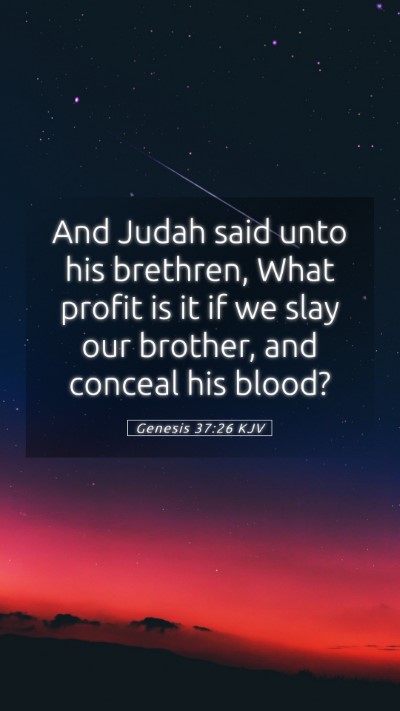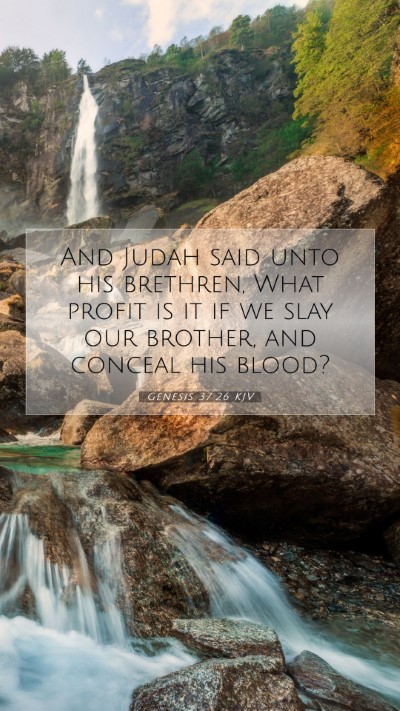Understanding Genesis 37:26
The verse Genesis 37:26 states: "And Judah said unto his brethren, What profit is it if we slay our brother, and conceal his blood?" This passage is rich in meaning and serves as a crucial moment in the narrative of Joseph and his brothers. Below, we will explore various interpretations of this verse derived from public domain commentaries, focusing on the implications of Judah's words and the actions of his siblings.
Bible Verse Meanings
This verse encapsulates Judah's pivotal decision-making process, highlighting inner conflict and morality in the face of temptation. The discussion leads us to a deeper understanding of human nature, family dynamics, and the consequences of sin.
Judah's Proposition
According to Matthew Henry, Judah is portrayed as the first to express concern regarding the morality of their plans to kill Joseph outright. His suggestion to reconsider their actions stems from a more shrewd and practical perspective: What profit will come from murder? This shift indicates a conflict between desire and ethics that resonates deeply in biblical narratives.
Profound Moral Inquiry
Albert Barnes elaborates, suggesting that Judah’s rhetorical question highlights the brothers’ awareness of the gravity of their intentions. The questioning tone implies that while they were tempted to eliminate Joseph, deeper reflection reveals the moral and ethical repercussions of such violence. This moment serves as a turning point which leads to alternative, albeit still morally questionable, actions later in the narrative.
Tragedy of Sin
Adam Clarke adds another dimension to this discussion, indicating that Judah’s statement not only reflects practical reasoning but also foreshadows the sorrow and consequences of their actions. The brothers were contemplating not just the physical act of killing Joseph, but also the long-term impact of such a sin upon their family and the generational curse that could arise from such decisions.
Biblical Exegesis
This verse is critical for understanding Scripture because it reveals the complexities of human emotion and family conflict. The insights from these commentaries provide a lens through which modern readers can explore their own ethical dilemmas and moral choices.
Historical Context
In understanding the historical context of Genesis 37:26, we note the significance of brotherhood and familial loyalty in ancient cultures. Judah's argument indicates a shift from passionate hatred to a more calculated consideration of familial bonds and the shared consequences of their actions. Such cultural analysis enriches our understanding of the scripture.
Symbolism and Moral Lessons
The symbolism inherent in Judah’s statement suggests that poor choices are often made out of great emotion. By stepping back and asking “What profit is it?”, he symbolizes a moment of clarity amidst chaos. This reflection is applicable to the moral lessons that can be drawn from the verse concerning the importance of thoughtful action versus impulsive decisions.
Application to Daily Life
When considering how to apply Genesis 37:26 to daily life, we see a call for self-reflection before acting on impulse. The concept of weighing the moral implications of our choices resonates powerfully with modern readers, encouraging them to engage in thoughtful discussions during Bible study groups or online Bible study forums.
Bible Study Insights
For those involved in Bible study lessons, this verse may serve as a discussion point on themes of ethics, responsibility, and choosing the right course of action. It provokes questions like:
- How do our family dynamics influence our decision-making?
- What are the consequences of our actions on those we love?
- In what ways can we encourage moral reflection in ourselves and others?
Related Bible Cross References
- Genesis 37:18-24 - The initial plot to harm Joseph
- Genesis 42:21 - The brothers reflecting on their guilt
- Proverbs 14:12 - The caution against a way that seems right but leads to death
Conclusion
In conclusion, Genesis 37:26 offers a rich tapestry of meaning, layered with moral, ethical, and practical implications. By examining Judah's query through the lenses of respected commentaries, we can garner valuable insights that not only inform our understanding of this specific scripture but also encourage thoughtful living and ethical reflection in our daily lives.
The transformative questions raised by this verse inspire further exploration in Bible study groups and encourage us to delve into more in-depth Bible verse analyses. The quest for understanding Scripture through such narratives ultimately aims to guide us towards living righteously amidst life's complexities.


